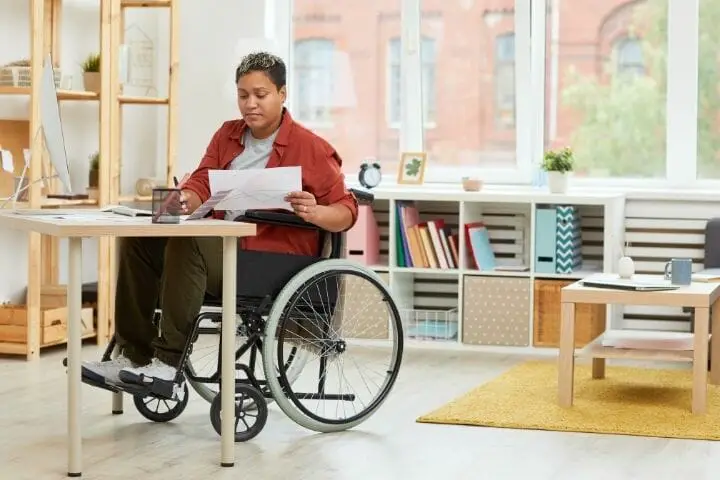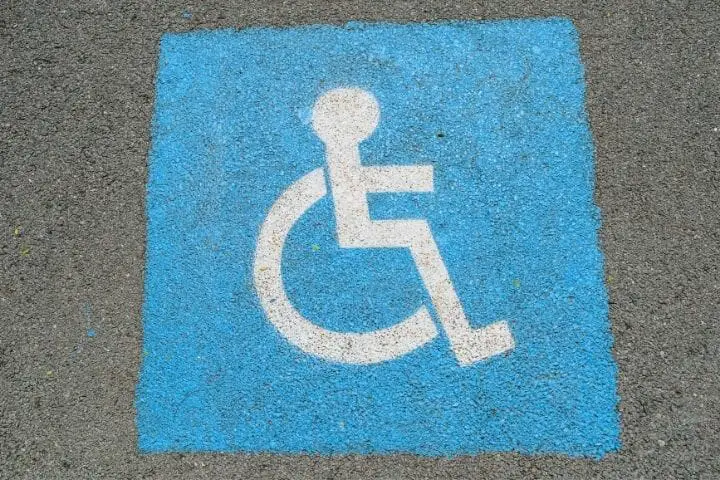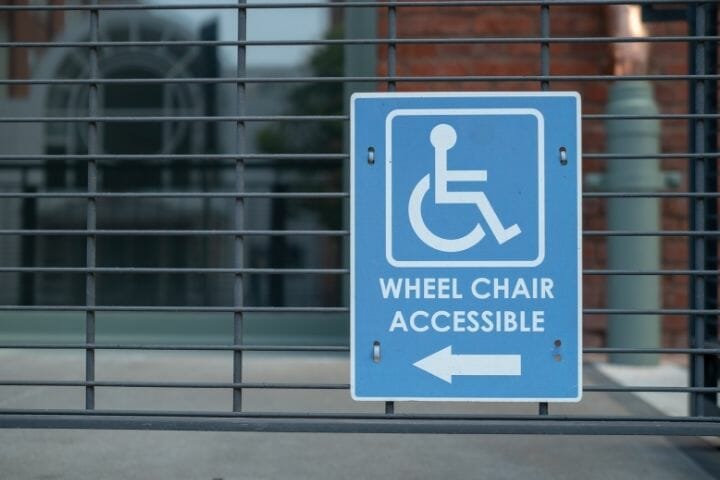The Americans With Disability Act protects the rights of the disabled and ensures equal treatment at every step for them. Let’s learn more about this act in the article below
Contents
Disability is a physical or mental impairment that makes it challenging for you to do various daily essential activities like feeding, bathing, dressing, or communicating with the World effectively. Over 1bn people live with disability in the world (1 in 7) and 1 in 4 people live with disability in the US.
The Americans With Disability Act is a civil rights law that prevents discrimination on disabilities based on employment, transportation, telecommunication, and in state and local governments. The main aim of this law is that individuals with disabilities should have equal rights and opportunities like other normal people.

In 1986, the National Council of Disability recommended the enactment of the Americans With Disability Act. It drafted the first version of the bill, which was introduced in the Senate in 1988. The bill was signed into law in 1990 by president George H.W Bush. The law was later amended in 2008 and became effective from 1st January 2009.
The ADA does not specify the types of disabilities covered in this act. However, you need to be disabled to be protected from the law. This article discusses the Americans With Disability Act in detail.
What Are Titles Of Americans With Disability Act?
Before ADA, many hiring managers thought that disabled individuals were unsuitable for doing jobs. So they don’t hire these people despite having a lot of talent.
It’s sad to see a blind Harvard student unable to get a job interview in a good company because of disability or a military person who served many years for the country but lost his limbs or has severe burns for which he cannot continue his job.
Luckily ADA opened the doors for disabled people in the United States. Now disabled people can get equal employment opportunities like everybody else, and if anybody discriminates against them, they can be dragged to court.
The act even bans the employers in an organization to ask the applicant about disability. Additionally, ADA provides public buildings and transportation to add greater accessibility for disabled people. Five titles or sections of the American disability act relate to different areas of public life. I am listing them below.
#1. ADA Title 1 (Equal Employment Opportunity For Disabled People)
This title is mainly designed to help disabled people to have the same employment opportunities as other normal people. It prohibits
- Private employers
- State and local governments
- Employment agencies
from not discriminating against qualified individuals with disabilities in
- Hiring,
- Job application,
- Job training,
- Compensation
and other employment-related aspects.

The ADA covers employers with 15 or more people. It is also applicable to employment agencies and labor organizations. The ADA nondiscrimination standards are also applicable to Government sector employees under section 501 of the rehabilitation act.
An individual is said to be disabled if he meets the following criteria.
- Has physical or mental illness and is unable to perform major life activities.
- Has a record of such type of illness
- Regarded as such type of impairment.
Reasonable Accommodation
A qualified applicant with a disability is a person who can perform the job function with or without reasonable accommodation. The employer should provide reasonable accommodation so that the qualified disabled person can have equal opportunities like ordinary people.
However, reasonable accommodation should not impose any hardships on the operation of the business. Undue hardship refers to activities that are extremely difficult for the employer—for instance, increasing the organization’s size, financial resources, and investing in capital expenditure beyond reasonable measure.
The reasonable accommodation includes the following.
- Employers should make the existing facilities readily accessible to be used easily by individuals with a disability.
- Job reconstruction and modifying workplaces
- The employer should acquire or modify equipment, devices and training materials needed by the disabled person.
Every qualified individual with a disability will not require accommodation. For instance, a deaf applicant will need a sign language interpreter at the time of the interview. An employee who has diabetes will require certain breaks during his working period to take nutritious food at the correct time.
A diabetic patient needs to maintain the blood sugar and insulin level. An employee with cancer will need breaks for radiation or chemotherapy treatments. A blind employee will need someone to read vital information to give the job interview properly.

An employer should provide reasonable accommodation after getting a request from a qualified employee. The employee should discuss the needs and wants with the employer.
Consequently, the employer identifies the appropriate reasonable accommodation. But if the qualified individual with disabilities requests more than one reasonable accommodation, the employer chooses the one that involves low cost and is easy to provide.
Title 1 of the ADA covers the following
Medical Examination
The employer does not have the right to question an applicant about the nature or severity of the disability. However, the applicant can be asked several questions about the job and duties.
An employer can do a medical examination of an applied applicant with a disability only if it is job-related and compulsory for other normal applicants. The employer should keep the medical information confidential.
Alcohol And Drug Addiction
Alcoholism and drug addiction are both disabilities under the Americans With Disability Act, but they are treated differently. An alcoholic is a person with a disability under the American disability act, and the employer may consider accommodation if he performs well in a job interview.
However, an employer has the right to deny or discharge an alcoholic if his use of alcohol adversely affects the performance of the job.
Again a person who is addicted to drugs but is no longer using drugs illegally or receiving treatment for addiction to drugs or has been rehabilitated successfully is protected under ADA can be considered for employment.
However, if a drug test shows that the applicant or employer is currently using drugs, he is discarded from ADA protection.
Employer Benefits for ADA Title 1
Small Business Tax Credit
Small businesses with $1,000,000 or less revenue may take a tax credit up to $5000 yearly for providing reasonable accommodation to the employers like a sign language interpreter, purchase of equipment for modification, removal of architectural barriers, or braille.
Work Opportunity Tax Credit
The employers who hire people from low-income groups like the one receiving supplemental security income or the one referred from a Vocational rehabilitation agency may get a tax credit of $2400 yearly for each qualifying employee who works at least 400 hours in the tax year.
Architectural Or Transportation Tax Deduction
This deduction in tax is designed to help businesses to remove the transportation and architectural barriers for the mobility of a disabled person. It includes wheelchair-accessible telephone, accessible parking spaces, ramps, and making walkways 48 inches wide.
The business may claim up to $15,000 tax deduction per year for the cost of removing architectural or transportation barriers for disabled people.

How Can I File A Complaint If I Am Discriminated Against as Per ADA Title 1?
You can file the complaint with the U.S Equal Employment Opportunity Commission within 180 days from the date you are discriminated against or 300 days if the charges are filed with a state or local employment agency.
The field offices are located in almost all the cities of the United States. You can contact them either by visiting their office or by the phone numbers given on the site.
#2. ADA Title II
The ADA Title II is divided into two types. Part A covers all the programs and activities related to State and Local Government, whereas part B covers requirements for public transportation.
ADA Title II Part A :State And Local Government Activities
Title II states that the State and Local Government should give equal opportunity to people with disabilities. It includes public education, employment, public health care services, court, recreation, town meetings, etc.
All the State and Local Governments in the United States should follow specific architectural guidelines while making new buildings to not discriminate against any individual with disabilities.
The Government should take effective steps in relocating programs and making old buildings accessible so that they can adequately address the issues of individuals with hearing, speech, or vision problems.
The public entities will not take any action to result in inappropriate financial and administrative burdens. They will only make necessary modifications to policies practices to avoid discrimination until they find that doing so will fundamentally change the nature of service or program.
If you find that anyone violates the rules and regulations under Title II, you can file a complaint against the Department of Justice within 180 days of the discrimination. You will be referred to a meditation program to solve the issue in some cases.
ADA Title II Part B:Public Transportation
The ADA Title II covers public transportation services in city buses and public rail transit. The public transportation authorities should not discriminate among individuals with disabilities in providing services.
They must remanufacture buses to be appropriately accessible by disabled people, make changes, or provide paratransit in fixed-route bus or rail systems.
Paratransit is a system that buses will adopt when people cannot use the normal transit system independently because of physical or mental illness. The authorities on the bus will take responsibility for picking and dropping the disabled people at their destination.
The ADA also sets minimum space in public transportation services where disabled people can safely keep their wheelchairs.

How Can I File A Complaint If I Am Discriminated Against as per ADA Title II Law?
Non-Transportation Issues
Every public entity that employs more than 50 people has its internal grievance procedure and has an ADA coordinator responsible for resolving ADA complaints. You can contact the public entity and ask for an ADA coordinator and complaint process.
You can file a complaint against the public entity with the U.S Department of Justice if you feel that you are a victim of discrimination prohibited by ADA Title II. Your complaint should be in writing signed by an authorized representative and should contain your name, address, and describe the discriminatory action of the public entity.
It should include the date on which discrimination has occurred names of people involved in discriminating against you. You can include photocopies showing that you are discriminated against or any relevant information that supports your complaint effectively. You can even file a complaint against the public entity by filling out an online form.
Transportation Issues
The public entity which operates transportation services has its grievance procedure and designated coordinator. You can contact the public entity and ask the ADA coordinator to file a complaint if you think you are discriminated against from ADA Title II rights.
You can also file a complaint with the Federal Transit Administration. To file a complaint, you have to fill out a complaint form. Additionally, you need to write a brief introduction about what had happened on that day, the date, and the names of the people involved in discriminating against you.
#3. ADA Title III (Public Accommodations)
Title III says that public accommodation in private places, ground transportation services, and educational testing services should not discriminate against individuals with disabilities.
After ADA came into effect, all new constructions should follow the rules and regulations of Americans With Disability Act accessory guidelines, i.e., It must be accessible to people with disabilities. Again public accommodation should remove barriers in old buildings for disabled people

#1. Public Accommodation
The public accommodation is open to the public for business and includes the following
- Hotels/motels
- Places that serve food or drinks
- Theaters
- Auditoriums
- Museums
- Galleries
- Retail Stores
- Shopping malls
- Recreational facilities, for example, amusement parks
- A health service provider like hospitals, doctor offices
- Educational facilities like private schools or colleges
- Social service centers like daycare for old adults or children
- Exercise and recreational facilities like gym
Churches and the facilities which directly operate like schools or child development centers are generally not covered by ADA 111 rights.
However, if they receive federal funding, they may be covered by section 504 of the rehabilitation act 1973. Again private membership clubs and facilities are also not covered by ADA.
#2. Ground Transportation
ADA 111 includes taxis and buses, which privately-owned companies operate. There are legal disputes about whether ADA covers ride-sharing companies like Uber. But several judges ruled that they’re covered under ADA.
#3. Educational And Professional Testing Services
It includes examinations and courses related to application and certification.
What Rights Are Protected By ADA Title III?
I have listed below some rights generally protected by ADA Title III.
#1. Modification In Policies And Procedures
The public accommodation should make some reasonable modifications in their policies and procedures so that individuals with disabilities can have equal access like normal people. One example of modifying policy is to allow service animals in places where people are not allowed to come with pets.
A public accommodation will not modify its policy and procedures if it involves a change of its goods, services, or operation, which would indirectly change the nature of the business.
For instance, a doctor specializing in burn treatment may refer a disabled individual to another doctor if the individual is not interested in burn treatment. But a burn specialist cannot deny giving burn treatment to a person who has AIDS or HIV positive.
Similarly, a clothing store does not require a personal assistant to help someone in a wheelchair try clothes unless the store provides that service to all the customers.
A public accommodation may deny a request if an individual with a disability poses a threat to the health and safety of other people.

#2. Service Animals
ADA provides coverage for service animals. The guidelines of ADA protect individuals with disabilities and compensate for the loss in business by granting access to service animals on the premises.
The business has permission to ask whether the animal is a service animal and about the tasks on which the service animal is trained. Still, they cannot ask the service animal to perform the task or ask about the ID of the animal.
A business cannot remove an individual with a disability unless either of the two things happens on the premises. The first one is if the service animal goes out of control and the owner fails to control it. For instance, if the dog barks uncontrollably in a restaurant, then the restaurant owner may ask the disabled individual to leave the restaurant.
The second one is if the service animal is a threat to the health and safety of other people, then the owner may ask the disabled individual to leave the premises.
The business that prepares or serves food should allow service animals and their owners on their premises despite State or local health laws prohibiting entering service animals. However, the business which prepares or serves food (for example – restaurants and hotels ) is neither bound to provide food nor a separate place to the service animal.
Again, people who require service dogs should not be charged an extra fee for their service animals. The owner of the service dog should be treated well like other customers. However, if the business charges for damaging property from other customers, it has the right to charge a disabled person for his service animal damage to the property.
Auxiliary Aids For Proper Communication
A public accommodation may provide auxiliary aids to disabled people for effective communication. The auxiliary aids are such items that help effective communication with people who cannot hear or are blind, or have a speech disability. I am listing some examples of auxiliary aids below.
- Braille materials
- Qualified interpreters
- Assistive listening headsets
- Screen reader software
- Television captioning
- Accessible electronic and information technology
- Videophone and captioned telephones
- Secondary Auditory Programs
The Americans with Disability Act (ADA) says that public accommodation should take some necessary steps like providing auxiliary aids so that an individual with a disability will not be segregated or denied any services.
They should be treated in the same way as normal people. However, auxiliary aids are not mandatory if it becomes an undue burden for the public. The undue burden is evaluated by considering factors like the nature of the accommodation, cost involved, the impact of accommodation, and various others.

The auxiliary aids have grown popular after the American’s disability act (ADA). Captions are now considered one type of auxiliary aid. The educational, entertainment and training materials are now captioned for individuals with a disability and mainly for deaf people.
The Television Decoder Circuitry act (1990) says that all televisions more than 13 inches big and sold in the United States after July 1993 should have a decoder that enables a viewer to watch a close captioning program.
#3. Removal Of Architectural Barriers
The Americans disability act requires the removal of architectural barriers in facilities where it is readily achievable (can do modification without much difficulty or expenditure). Tax breaks are available to businesses that provide ADA accommodations so that disabled individuals have an equal opportunity like ordinary people.
I am listing below some examples of barrier removal
- Installing ramps
- Rearranging furniture
- Widen doorways
- Making curbs that are accessible on sidewalks
What Can I Do If Title III ADA Rights Have Been Violated?
#1. Contact The Owner
You need first to contact the company owner if you find that some people are discriminating against you for disability. The best way to notify the owner is by writing. I will recommend you keep a copy of the letter for the records to prove that you have made a complaint.
#2. File Complaint With The Department Of Justice
Suppose you cannot resolve the issue related to discrimination of disability with the owner of the company. In that case, you have the right to file a complaint with the Department of Justice. There is not a fixed time limit in filing a complaint. But I will advise you to complain as soon as possible.
The Department of Justice usually does not investigate all matters. So you can request mediation of the complaint.
#3. File A Lawsuit
You can file a lawsuit under the American disability act Title III within three years from when ADA rights violate you.

#4. ADA Title IV – Telecommunications
Disabled people find it challenging to communicate with their friends or family members over the telephone. The ADA addresses the problem of millions of disabled people who have limited access to use the telephone.
Title IV of the American’s Disability Act amended the Landmark Communications Act by adding section 47 U.S code.
This section says that all telephone companies should provide continued voice transmission relay services. It will help all individuals with hearing and speech problems communicate by telephone through a keyboard or other assistive device, which is functionally equivalent to persons using a telephone without any disabilities.
The Telecommunication Relay Services (TRS) is available in all 50 states of the United States and U.S territories for long-distance international calls. The TRS helps enable telephonic conversations between individuals with and without hearing ability. There are various types of TRS available. I am listing some of them below.
- Captioned Telephone service
- TTY Relay Service
- Speech to speech relay service
- Internet protocol relay service
- Video relay service
The most common type among the ADA title IV TRS services is the TTY relay service. In TTY calls, the typed messages by a deaf person are relayed as voice messages by a relay assistant or communicative assistant.
It allows the caller who cannot use the regular telephone because of disability to place a call to a person without a disability and vice versa. The Emergency Broadcast System was established to transmit emergency messages on radio and television in 1963.
But unfortunately, people with hearing problems cannot hear emergency messages. So, they have to depend on others. The ADA title IV mandates that Government-funded television public service messages should be close-captioned for individuals who have hearing problems.
#5. ADA Title V (Miscellaneous Provisions)
The title V of America’s disability act includes a variety of provisions that relate to ADA as a whole and have its relationship with other laws, state immunity, impact on insurance providers, attorney fees, and illegal use of drugs. It also provides a list of specific conditions that are not considered a disability.
You might also like to read: What are the ADA Requirements for Grab Bars?
Wrap Up
Disabled people find it challenging to study and do jobs like normal people. Before the American disability act, one in five disabled adults did not graduate from high school in the United States. In 1997 33 percent of the disabled people lived in a household with an annual income of less than $15,000.

Thankfully ADA has increased the opportunities of disabled people to study and do jobs like everybody else. They can get the same facilities in public transportation services and other private places like gyms, hotels, movie theaters, and others like ordinary people.
I hope this article helped you understand the significance of the ADA, and the benefits that it provides for every fourth person living in the United States!
Please don’t forget to share this article with others that are also searching for this information. If possible, share this article on social media so that the content can help others who may need this information like yourself.
You can ask us your queries related to ADA in the comments section, we will be happy to answer all your queries.
